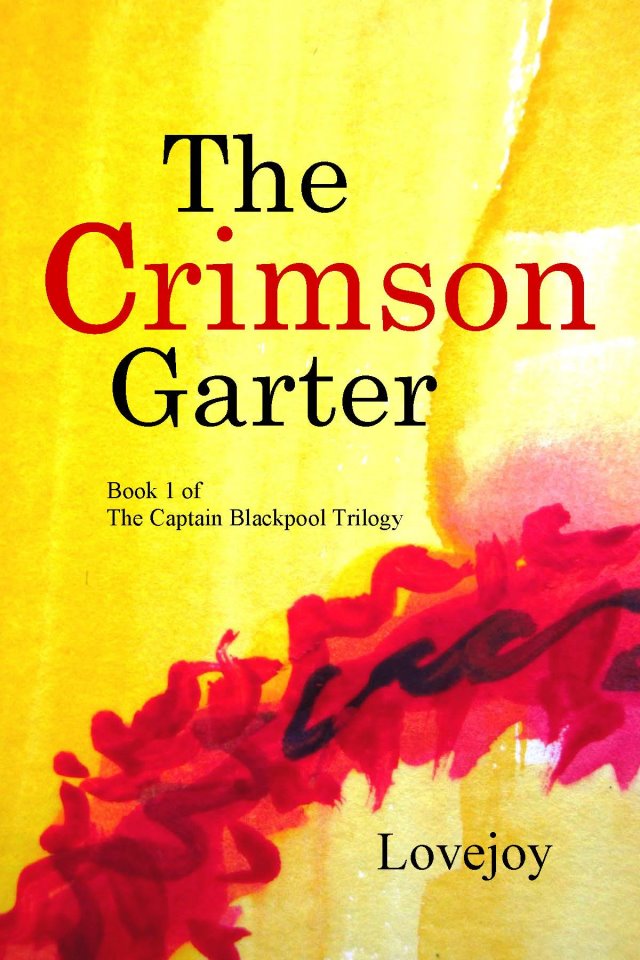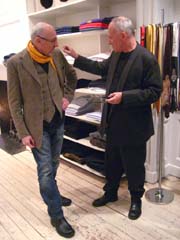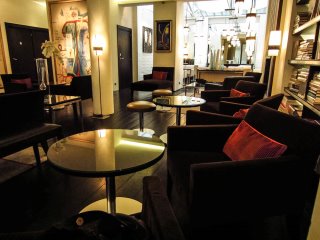
The Marshes have made it to London—as have Vittorio Rosetti and Capt Blackpool—and Sir Robert Marsh has made it to the auction on time in the hope of purchasing The Cogitations on Identity. In chapter eight, we return to Praha, at the atelier of Count Laszlo Kozlowski, in The Crimson Garter, by travel editor Stanley Moss, writing pseudonymously as Lovejoy
Chapter 8
Letter from Humphrey, Earl of Pinckney
To Amanda Pennington-Smythe
Mailed from Dover
Darling Amanda,
I write you with great haste before boarding the HMS Dartmouth headed for Calais in hopes that by now you will have received the shawl of Scottish lace which I had sent to you from Aberdeen. You will note that I have taken great pains to have your initials embroidered into one corner of the wrap. My own initials, dearest dear, I ordered modestly sewn on the other side. Do you see, dear girl, that should you at some future time decide to change your name it would in no way affect your monogram? I hope when you are enveloped in its warmth you will think of me and our growing acquaintance.
The matter of diplomatic importance on which I am travelling compels me to write only a few words. I beg you not to reveal to any who might inquire of me, my sweet Amanda, either that I am headed for Paris, or that the mission requires I attend the ball of the Baron Schluysen-von Holstein. It has been urged upon me to discover the truth about a secret matter I cannot reveal. Say nothing of this, and should anyone ask about my whereabouts I beg you to feign ignorance, save that I am somewhere abroad on extended leave.
Kind Amanda, remember me with your heart, and know that as the wrap enfolds you, think of my arms, my darling dearest, which reach out for you from across the sea.
Your most humble and affectionate, etc. etc.
Pinky
At first, luck had favoured Laszlo Kozlowski. Despite the initial pains of his forced marriage much good seemed to present itself with the return to better circumstances. The apartment he had found at the Hotel Czerny was a grand and spacious lodging, with many balconies, a comfortable library, and tall windows which looked down on a variety of splendid views. Almost immediately he had discovered that the attic of the hotel, which had been closed off for a number of years, was a perfect atelier space, and he rented it without hesitation. The attic possessed high oval windows and lofty skylights, an expansive wood floor, long stretches of empty walls, and an assortment of old furniture which he rearranged into comfortable groupings. He added easels and brought in quantities of pigments and brushes and turpentine and solvents, and created for himself the finest workspace he had ever experienced. And though the creative energy did not equal that which he had felt in Paris he hoped that eventually the fire of inspiration would return. He spent many an hour in the atelier, moving from canvas to canvas, searching for the moment when he would be touched by the muse. Alas, the muse largely escaped him, for his mind often roamed back to Paris. Too frequently he found himself wondering what had happened to Grazia Rosetti, and if he would ever see her again. One afternoon he wearily climbed the stairs to his aerie, lost in doubt and ravaged by thoughts other than those concerning his artistic endeavours.
Outside, great masses of purple clouds moved over the city, an apt metaphor for the Count’s mood, as he brooded over his situation. He had paced the rough wood floor for some time, unable to mix a colour, finally staring out across the view, reflecting on the strange matter of an overheard conversation. It had occurred the night before at yet another tiresome salon. Gertrud had invoked the debt of their marriage in order to secure his attendance. Kozlowski had been listening to the tedious recital by a thin voiced soprano when he clearly heard two courtiers behind him engaged in an explicit conversation of harsh whispers. Their words alluded in no uncertain terms to the escapades of his wife Gertrud with one of her grooms. Kozlowski knew that it had been intended for him, since the courtiers made no effort to conceal their remarks.
‘It is rumoured that she enjoyed the horse as much as the groom,’ one of the men had sniggered.
‘And I have heard it said the horse too was well-satisfied,’ the other reported, chortling. Kozlowski had not given them any acknowledgement, but the accusation stung him, and he felt the wicked disdain of people around him.
Suddenly months of vague innuendo and odd gazes, which had made only a small impression on him, came together as overwhelming evidence that the mutterings were absolutely true, that the Countess Gertrud enjoyed relations with her grooms. Had it been kept secret he would not have minded. These things were often done in a marriage blanc. But she had displayed a flagrant disregard for the exercise of discretion. It seemed that her vulgarity knew no bounds. She had, he suddenly realized, inspired a lascivious popular song which had been circulating in Prague for some time, wherein a high-born horsewoman takes a tumble upon a hill with a groom. There had even been a satiric etching circulating on the same theme. The evidence of her misconduct could no longer be ignored.
But Kozlowski knew he too had isolated himself, in an attempt to remain as far away from anything that could resurrect memories of Paris and La Fragolina. He had avoided the normal periodicals for fear that they would summon too many familiar places and names, which would lead to greater melancholy. Furthermore, the Countess’s censure of anything Parisian, which she clearly associated with Kozlowski’s bohemian episode, made it impossible for him to ever speak of Paris at all when he was with her or her friends. He understood how important it was to maintain his separateness from his identity as Balthazar. He found his emptiness further compounded by the strange lack of communication from Misha Stefan, who had heretofore written him a note at least once a month. Despite several attempts by mail, Misha’s silence had been obvious, alarming, inexplicable. Kozlowski would daily retire to his studio at the top of the hotel, where he could attempt to paint and ponder his isolation. Yet no matter how hard he tried to suppress his thoughts, memories of La Fragolina came rushing back to him. He would return to the notebooks of studies for the painting of The Crimson Garter, and when he could stand it no longer he would draw her from memory, first as a ballerina, and then as a nymph, and then as a Greek goddess and then as an angel. But he carefully kept the notebook hidden, concealing it below a massive volume of Italianate reproductions which he lodged in a deep drawer of a heavy wood desk. He knew it would serve no purpose if Gertrud got her hands on it. He supposed that Gertrud would never lift a volume that weighty to see what was underneath.
Kozlowski was startled by a loud and rapid knocking on the door of his studio, and so he navigated the narrow staircase down to the top residential floor of the Hotel Czerny. He unlatched the door and found, to his great surprise, Gertrud, Countess Kozlowski, who wore an angry look. It was highly unusual that she even showed herself outside their formal schedule of social appointments.
‘Out of my way, Laszlo,’ she huffed. ‘There is something of the utmost importance that we must speak about immediately.’ She pushed past him and clambered up the narrow staircase, her cheeks flushed. ‘I have only five minutes before Wuschi will be ready for me downstairs. He is at this moment in the chair of the good parrucchiere Signor Adolfo, and I cannot keep my precious waiting.’ Kozlowski scowled. He supposed Gertrud was about to say something useless concerning the thickness of the cream in last night’s eclairs and the incompetence of the chef who created them. Or perhaps a favourite horse of hers had again thrown a shoe and she had fired the current blacksmith in charge and meant to turn it into a diplomatic crisis.
Instead, Gertrud stalked around the studio, and breathing heavily she looked over the airy skylit space, her face a bitter mask. ‘I will never understand your fascination with this horrible attic,’ she sneered. She pointed to a canvas on an easel at the far left.
‘Whose painting is that? The Princess Stefanie, the Countess Grabowski, or Byczkowski, all whose faces you have yet to deliver. You accepted commissions from the highest of the social elite of Prague, yet nobody has seen one finished painting. Do you understand how this reflects upon me? You cannot comprehend the humiliation I am feeling. People laugh at me behind my back because they know you have not completed a single work. Perhaps you are not up to it.’ She walked to another canvas, brought her nose close to it, and scratched the surface with her fingernail.
‘Don’t touch that!’ he cried. Quickly she drew away her finger, scowling at the blotch of garnet she had detached.
‘Here, for example, the likeness of this groom Arkedy, is all wrong. You have made his ears too big, his nose too large. His hair is a more pleasing shade of straw, like the colour of hayfields in autumn. You have rendered this dog in the corner of the painting more lively than that of the horse. And upon the horse, this blurry form, who can that be? Anyone!’ Gertrud’s attention turned to the adjacent easel. ‘I recognize this horse,’ she said. ‘It resembles Byczkowski’s. But the posture is very strange. It is as if he is supporting three riders, not one.’
‘He may as well be,’ Kozlowski muttered.
‘What do you mean? Then this is Byczkowski? And what of this ancient temple, or of this figure who stands in shadow with a veil upon her face, and is miniscule compared to the column she leans against!’ She turned to the last painting, which was displayed next to a vase on a tabletop, a small but beautifully finished portrait of a Moorish man holding a balance weight. ‘And who is this?’ she demanded. ‘Why have you completed this when so many remain unfinished and neglected? None of these other pictures can be shown in their state. Perhaps we should call for that mysterious artist from Paris, Balthazar, and ask him to complete the work which you cannot. Perhaps he would be better suited.’
‘What do you know of the artist Balthazar?’ Kozlowski asked, shocked and roused from his determined silence.
‘Perhaps he moved in circles higher than your bohemian acquaintances,’ Gertrud suggested tauntingly. ‘For he is certainly more notorious than you ever were. He has exhibited a painting which has secured his fame in Paris, and now he is the most sought-after portraitist there. I thought certain you would be aware of this since he is in some way associated with your disgraced friend Misha Stefan.’
‘Are you certain of this, Gertrud?’
‘Absolutely. My friends have seen it reported in all of the journals. Surely you are not ignorant of the man’s success. It is only because you are conveniently present here that the gentle people of Prague have commissioned you to paint their portraits. You can be sure that if Balthazar were available it would be he that they asked to craft their likenesses. And perhaps rightly so.’
‘And how did Balthazar become so famous?’
‘Do not pretend, Laszlo, for it is unbecoming. Everyone knows he has exhibited a painting of the famous ballerina who mysteriously ended her career at the Opéra, and all of Paris is agog. This painting has caused such a sensation that everyone who is anyone wishes to be painted by Balthazar. But he has conveniently disappeared, another sign of his great cleverness. For he has only made himself more recherché, and will no doubt resurface once the market is in a frenzy of demand for him. I have had to deny to some of my closest friends that you are Balthazar, a ridiculous notion.’ Gertrud twitched nervously, and a determined expression appeared on her face. ‘Perhaps this is an opportunity. You shall paint me in that fashion, and then your reputation in Prague will soar. Yes, that is it: I shall pose for you now.’ And she began to unfasten the laces on her bodice. ‘Come, help me off with my riding coat.’
The astonished Kozlowski moved toward his desk and poured himself a large tumbler of eau de vie, which he downed in a single draught. If what Gertrud said were true, it explained so much. Misha had shown the portrait against his wishes and then avoided corresponding once the furore had ensued. La Fragolina had been humiliated and scandal had surely followed. How intoxicated with her he must have been to show such a fantasy to Misha! Now, to rectify things, Kozlowski would need to get to Paris as soon as possible and retrieve the canvas before it did any more harm. And what of the indelicate situation with the Countess Kozlowski’s indiscretions? He returned his attention to his wife.
Still struggling with her garments, Gertrud had plopped down upon a chaise at the far end of the studio where she began to remove her boots. He noted that it was the first time he had seen her without clothes, and how small and unattractive were her breasts. Her hips were too wide and her shoulders too narrow. She would have been a disproportionate model had he ever chosen to paint her.’ What are you staring at?’ she demanded. ‘Why do you not help me?’
Kozlowski faced her from across the room, his arms crossed. ‘Have you encountered a popular ode entitled “The Ballad of the Lady and the Groom”?’
‘Why are you asking me about such a filthy and ribald song? What does that vulgar air have to do with the paintings we are discussing?’
‘I find it curious, Gertrud, that while you cannot recognize any of your friends in my paintings you immediately recognized the groom Arkedy. How do you explain that?’
‘Are you accusing me?’
‘Shall I?’ he asked.
At once the absurdity of the scene struck Kozlowski with an unimaginable suddenness. There on the chaise sat Gertrud von Thyssen, Countess Kozlowski, struggling, without a stitch of clothing save her hose, trembling, seething with anger and ready to sneer at him again over some magnificent irrelevance. This time Kozlowski would not rise to the challenge. It was all so clear he could have painted the incredible comedy of it. It occurred to him that his entire life had become a farce, and at that realization he gave off with a disdainful snort, which further disconcerted and angered Gertrud. She had no idea that in the moment he understood that he cared nothing for her, he cared nothing for his title, that he must attempt to find the ballerina, and he knew that no amount of money could dissuade him. He longed for the simplicity of his life in Paris. He knew now he preferred the company of close friends over a glass of inexpensive wine at a sidewalk café, above all of Gertrud’s stuffy soirees and pretentious riding events. He felt no affinity for her aristocratic company, and if abandoning his title meant abandoning all those tiresome trappings then he would gladly do it, to be done with her superficial world.
Related articles hand-picked by our editors
 John Pearse: for a lifetime
John Pearse: for a lifetime
Stanley Moss finds the ideal fabric—but it’s up to John Pearse of London to shape it into a bespoke jacket
 Two Parisian hideaways
Two Parisian hideaways
Stanley Moss looks at two distinctive Parisian hotels on opposite sides of town, with very different characters
photographs by Paula Sweet and courtesy Hôtel Le A
 What do you think about that?
What do you think about that?
Stanley Moss has alternative perspectives on previewing the Biennale di Venezia
photographed by Paula Sweet
Advertisement
Copyright ©1997–2022 by JY&A Media, part of Jack Yan & Associates. All rights reserved. JY&A terms and conditions and privacy policy apply to viewing this site. All prices in US dollars except where indicated. Contact us here.